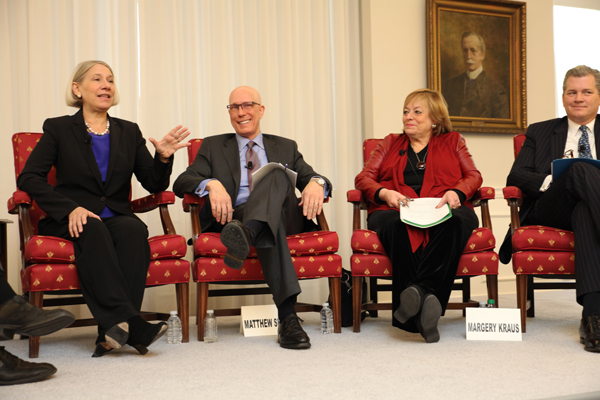‘Substance' key for CEOs seeking to increase influence
‘Substance' key for CEOs seeking to increase influence
- February 4, 2014 |
-
 Walt Williams
Walt Williams

Four leading observers say association leaders can get noticed by becoming compelling spokespersons
Washington, D.C., may be a town where who you know determines what you can do, but if association leaders can't build a strong argument for their issues, then those connections won't yield what they once did, according to the experts who spoke on power and influence at a CEO Update panel Tuesday.
"Relationships mattered much more 20 years ago," said Nels Olson, vice chairman of recruitment firm Korn Ferry. "With gift ban changes and the laws that have changed, you can't wine and dine policymakers as you used to. You really need to have the substance."
|
That was one takeaway at the Tuesday event, held at the SunTrust Bank Building in D.C. Olson was one of four panelists who spoke about how associations could effectively wield power and influence in today's political environment. The others were Matthew Shay, CEO of the National Retail Federation; former White House communications director Anita Dunn; and Margery Kraus, CEO of APCO Worldwide.
For Dunn, a key trait for any good CEO was becoming an effective spokesperson for the industry, something she said could easily be overlooked.
Credibility comes from "knowing your issue, and also knowing why that issue should be important to the person you're talking to," she said. "It is relevant to you: Why is it relevant to them? That's framing an argument."
CEOs need to have a clear vision about direction for an organization and how they want to present that vision on issues of importance to their industries, Shay said. It is important they create a level of confidence and credibility with their boards so board members have faith in a CEO to move almost instantly when issues arise.
"If you have to go back to the bureaucracy to make decisions and people don't trust you, they're not sure where you are going to go, you can't do that as quickly," he said. "So part of it is having that confidence and being able to communicate it, so they say ‘we know where you want to go.'"
CEOs need to plan ways to build their reputational equity, Kraus said. That means identifying those aspects that move the needle for who you are, what you represent and what you need to accomplish. It also means identifying what stakeholders you need to engage in order to build that equity.
"That's your bank account for when things go astray," she said.
Look for full coverage of Tuesday's panel in the next issue of CEO Update, to be published Feb. 7.

 Four leading observers discuss how association CEOs can grow their influence during a CEO Update Live panel Tuesday. Pictured from left are former White House communications director Anita Dunn, National Retail Federation CEO Matthew Shay, APCO Worldwide CEO Margery Kraus and Korn Ferry Vice Chairman Nels Olson.
Four leading observers discuss how association CEOs can grow their influence during a CEO Update Live panel Tuesday. Pictured from left are former White House communications director Anita Dunn, National Retail Federation CEO Matthew Shay, APCO Worldwide CEO Margery Kraus and Korn Ferry Vice Chairman Nels Olson.